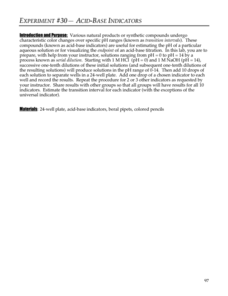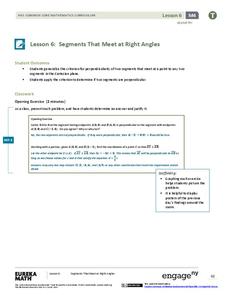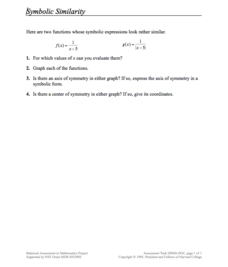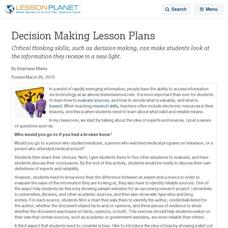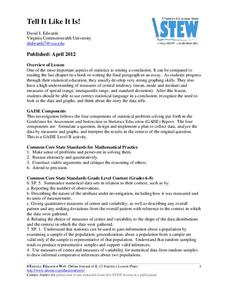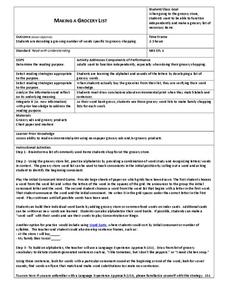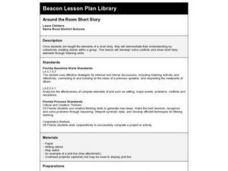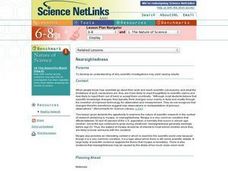Pingry School
Effect of Solutes on Boiling Point
Anyone that lives around snow knows that adding salts to water increases its melting point. Are there solutes that affect the boiling point as well? A scientific experiment has learners add different solutes to water and then monitor the...
Pingry School
Acid-Base Indicators
Acid-base indicators are an essential part of any chemistry classroom. Individuals explore the color-changing feature of the important indicators in a vibrant hands-on activity. Using serial dilution, learners create solutions ranging...
EngageNY
Segments That Meet at Right Angles
Can segments be considered perpendicular if they don't intersect? Learners look at nonintersecting segments on the coordinate plane and make conclusions about the lines that contain those segments. They determine if they are...
Concord Consortium
Symbolic Similarity
How many things does one transformation tell you? Learners compare and contrast the graphs of different parent functions with the same transformation. Using a rational and absolute value function, pupils identify key features of their...
Curated OER
Decision Making Lesson Plans
Critical thinking skills, such as decision making, can make students look at the information they receive in a new light.
Curated OER
Results and Conclusions
Fourth graders practice using the scientific method. In this results and conclusions lesson, 4th graders review data collected, create a graph of their data and make their final conclusions about the information collected.
Curated OER
Comparing the Degree of Unsaturation of Margarine with that of Butter
Is butter better? In terms of saturation, young chemists find out! Using titration methods, they will compare the degree of unsaturation of butter with that of margarine. Knowing the unsaturation, they can make conclusions about the...
Pennsylvania Department of Education
Drawing Conclusions Based on Literary Elements
Learners compare versions of Cinderella and draw conclusions based on the story elements identified. In this literacy comprehension and story elements activity, students read several versions of Cinderella, complete a "Comparing...
Virginia Department of Education
Logic and Conditional Statements
If there is a conditional statement, then there is a hypothesis and conclusion. Pupils learn how to identify the parts of conditional statements. Class members continue to work with conditional statements and rewrite them in their many...
American Statistical Association
Tell it Like it is!
Scholars apply prior knowledge of statistics to write a conclusion. They summarize using correct academic language and tell the story of the data.
Ed Worksheets
Read the Story
Want to boost your readers' comprehension skills and strategies? Look to these five pages, each with a short story and questions to answer covering main idea, facts, sequence of events, context clues, conclusions, and making inferences.
Nancy Fetzer's Literacy Connections
Expository Paragraph
Upper elementary and middle school writers learn how to craft an expository paragraph by following the six steps detailed in a 48-page instructional guide. Learners learn how to write six different types of informational paragraphs: to...
Trinity University
Explain Yourself: An Expository Writing Unit for High School
Introduce expository writing with a unit that asks writers to craft an essay to explain a belief, value, or priority that is important to them. Mini-lessons within the unit focus on crafting thesis statements and conclusions, selecting...
Chicago Botanic Garden
Recognizing Change (Observation vs. Inference)
What is the difference between making inferences and making observations? Young climatologists refer to a PowerPoint to make observations on each slide. They record their observations in a provided worksheet before drawing a...
Missouri Department of Elementary
What Are Bullying and Harassment? Part 2
After reviewing notes from the previous lessons, small groups obtain a scenario card that describes a situation in which bullying is happening. Peers discuss the event and brainstorm two solutions using the STAR method then present their...
US Department of Agriculture
Sink or Float?
Will it sink or will it float? Learners predict the outcome as they drop random objects into a container of water. Then, they keep track of the results and record the data in a t-chart to draw a final conclusion.
Las Cumbres Observatory
Down2Earth: Making Impact Craters
Is the sky falling? Learners use a simulator to modify the mass and velocity of asteroids and collect data on how they influence the diameter and depth of the impact crater. They use their results to draw conclusions and make predictions...
Curated OER
Predict, Draw Conclusions
Students discuss times they predict what will happen next. They compare this to using the information given in a piece of literature to predict what will happen next in the story. Students listen as the teacher reads an excerpt from The...
Curated OER
Lesson Five: Review Cause and Effect, Draw Conclusions, Compare and Contrast
Third graders review the concepts of compare and contrast, drawing conclusions, and cause and effect. In this literary elements lesson, 3rd graders write a paragraph that compares and contrasts the past to the present. They show cause...
Curated OER
Drawing Conclusions
Tenth graders explore why some teenagers take unnecessary risks. In this decision making lesson, 10th graders read an article on risk taking and draw important conclusions on the topic.
Curated OER
The Five Senses - Observation, Experimentation, Prediction, and Categorization.
First graders engage in this creative and well-designed activity. They rotate through five learning stations, each devoted to one of the senses. They practice observation, experimentation, prediction, and categorization.
Curated OER
Making a Grocery List
Students make a list and decode words that are related to grocery shopping. In this grocery shopping lesson plan, students discuss what you do at the grocery store.
Curated OER
Around the Room Short Story
Collective story writing is a great way to reinforce the concept of story elements and collaborative learning. Young writers discuss story elements such as, setting, character, action, climax, conclusion, foreshadowing, dialogue, and...
Curated OER
Nearsightedness
Examine the processes scientists go through to develop their conclusions. Using the internet, research the problem of nearsightedness and identify anyone they know with the condition. Discover the debate in the science world on this...



